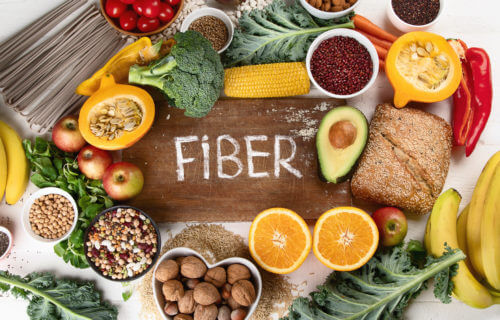EDMONTON, Alberta — You may have heard it countless times — eat more fiber, it’s good for you! Surprising new findings, however, suggest fiber can spell trouble for inflammatory bowel disease (IBD) patients. Scientists from the University of Alberta report certain types of dietary fiber cause an inflammatory response in some IBD patients, worsening existing symptoms.
The good news, researchers explain, is that these discoveries open the door toward personalized dietary guidelines that can keep IBD patients feeling good. The research team is already working on a stool test that will assess the microbes present in patients’ guts. This will facilitate predictions regarding negative fiber responses and make tailored dietary recommendations and treatments for individual patients possible.
Roughly 0.7 percent of Canada’s population (one in 150 people) has IBD, which includes both Crohn’s disease and ulcerative colitis. Estimates predict that the number will rise to one percent by the year 2030. Troublingly, the fastest growing group is children.
IBD symptoms usually include abdominal pain, diarrhea, bloody stools, and weight loss, but late puberty and a long-term risk of colorectal cancer also have a connection to inflammatory bowel disease. While the exact cause of IBD is still unknown, scientists believe that risk factors include genetics, diet, environmental factors, and changes among gut microbes.
“We know there are health benefits to consuming dietary fibers and they promote good gut health in healthy individuals, but IBD patients quite frequently complain about a sensitivity when they consume dietary fibers,” says Heather Armstrong, who is now an assistant professor of internal medicine at the University of Manitoba and Canada Research Chair in Integrative Bioscience, in a university release. “We really wanted to understand the mechanisms behind this.”
“By creating this stool test, we are hoping to be able to tell you how to adjust your diet to prevent flares or further worsening,” adds Eytan Wine, a professor in Alberta’s Faculty of Medicine & Dentistry. “It’s a dynamic situation so it’s possible that a certain food you should avoid now, in a few months you’ll be okay to eat that again.”
‘Not all fibers are born equal’
Unlike most foods consumed by humans, fiber is not digested in the small intestine. Instead, tiny bacteria and fungi (microbiota) within the large intestine or colon produce enzymes that ferment the fiber. Chemically speaking, fiber is a short string of sugars like pectin, found in citrus fruit, or a very long and branched structure that is harder to ferment.
The research team discovered that β-fructan fibers present in foods including artichoke, chicory roots, garlic, bananas, and asparagus are particularly difficult to ferment if certain microbes are either missing or malfunctioning, as is often the case among IBD patients.
“We are learning that not all fibers are born equal,” Prof. Wine comments. “We have shown that some fiber has the potential to cause damage, so we have to be much more selective about when we’re exposing our patients to it.”
For most people, eating more fiber is a great dietary choice; it offers a beneficial anti-inflammatory effect and helps with digestion. However, this research indicates a select number of unfermented fibers actually increase inflammation and worsen symptoms in certain IBD patients.
“We want to start uncovering why it is that 20 to 40 per cent of patients experience sensitivity,” Prof. Armstrong explains, “while in the other portion of patients these dietary fibers can actually benefit health and protect against the disease and have very positive effects.”
Researchers conducted this study using biopsies from over 100 pediatric patients at the University of Alberta Hospital.
Study authors clarify that any new dietary guidelines developed from these findings won’t replace drug treatments. Despite that, such dietary recommendations should complement more traditional IBD treatments, helping patients better avoid flares and return to remission as fast as possible after experiencing inflammation.
“I myself have IBD so I often come up with research questions that I personally want answered,” Prof. Armstrong concludes. “If we can find a way to reduce diet-related inflammation, we may be able to relieve some of the disease burden and even save some people from progressing to more serious disease.”
The study is published in the journal Gastroenterology.


Eating healthy foods and avoiding processed foods is the way to good health. I’m in my upper 60’s have low blood pressure, no heart disease, no diabetes and no chronic disease. I just try to eat a balanced diet along with some supplements as well. If we followed some commonsense guidelines and also ate a variety of healthy foods, there would probably be less of this. But most people go for the coffee and donuts and desserts too.
I feel like you didn’t read the article. I’m a vegetarian with IBD and grew up with a mother that we only had bran cereals and didn’t have sugary snacks and ate lots of whole grains and non processed foods. Every dinner was home cooked, except for 1x a month where we got to eat out. I went to Mexico City last week and I had the first week of non loose stools that I’ve had in 5+ years. Which is how I happened along the article, my only difference in eating behavior is I wasn’t eating as many leafy vegetables and all of my vegetables were cooked. As well as, all of the fruits I was consuming were from fresh juiced fruits.
TLDR – IBD isn’t caused by eating ‘bad foods’ and sometimes eating to many ‘good foods’ can be bad for people with IBD.
Soluble fiber has been shown in studies to promote IBS by the gas produced from the breakdown and fermentation in the gut. This causes pressure which stretches the colon contributing to diverticulosis..